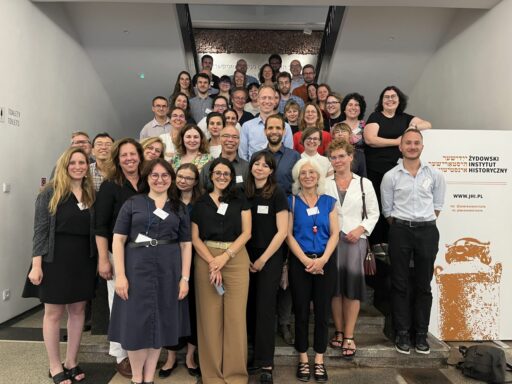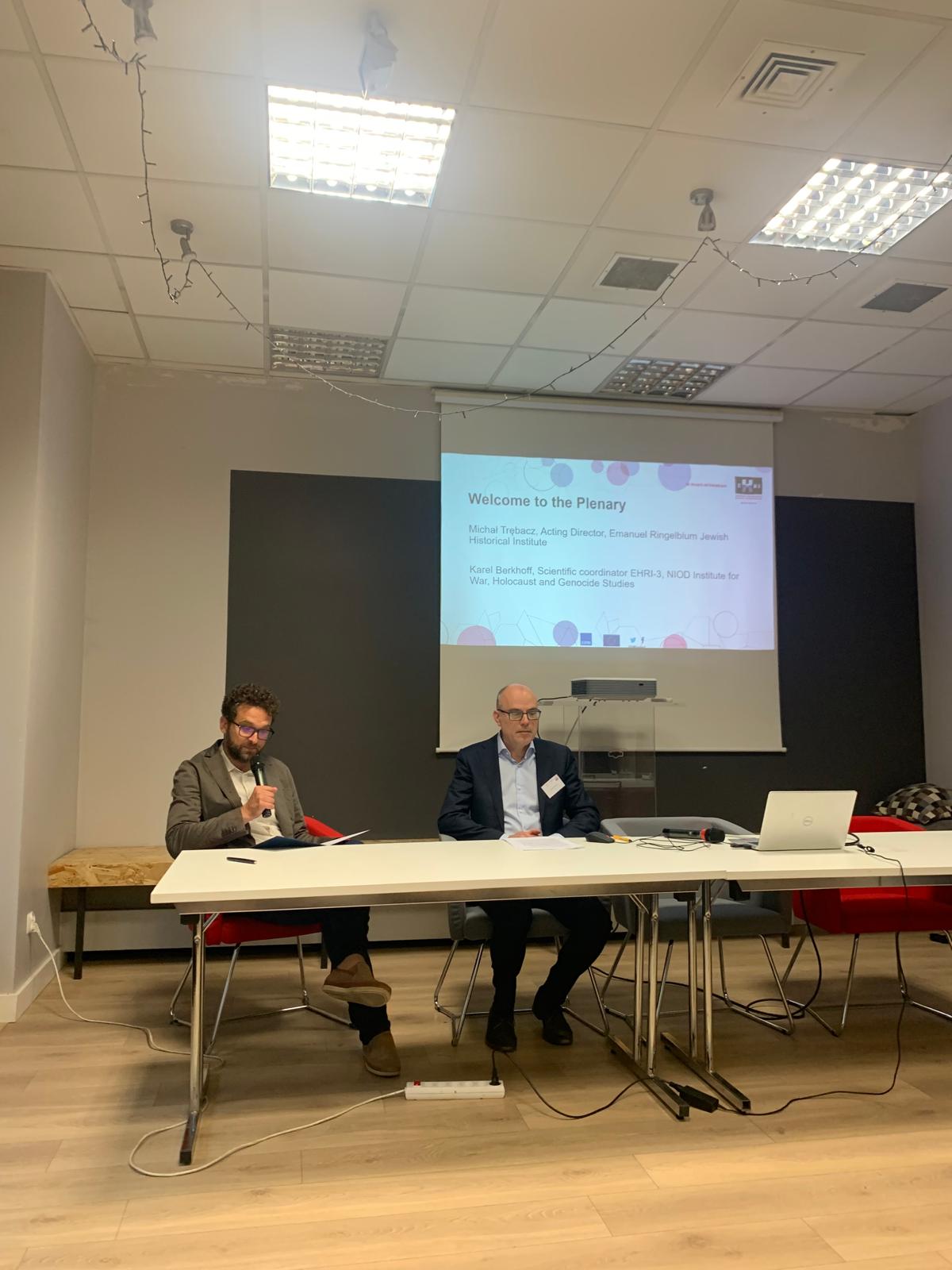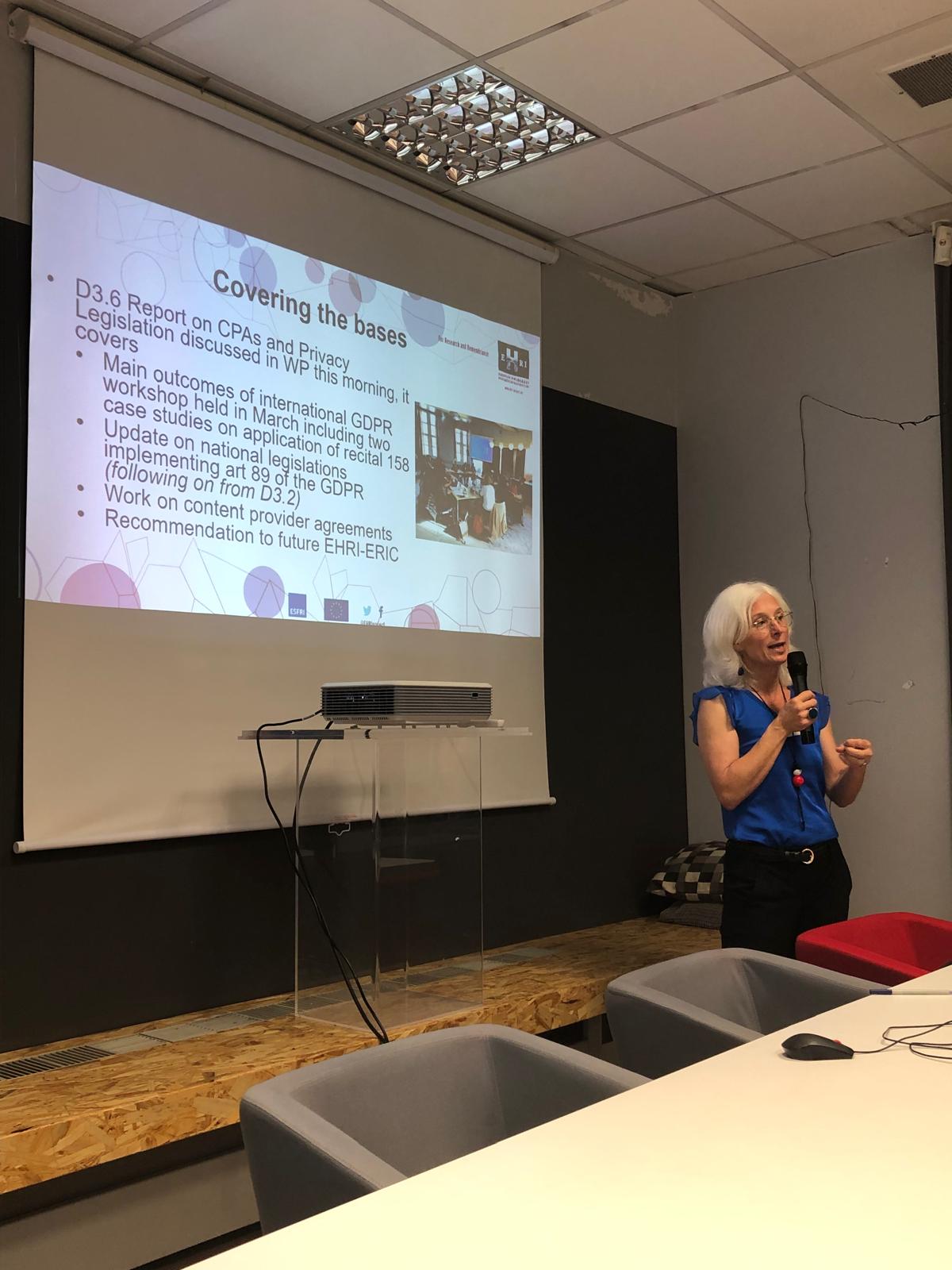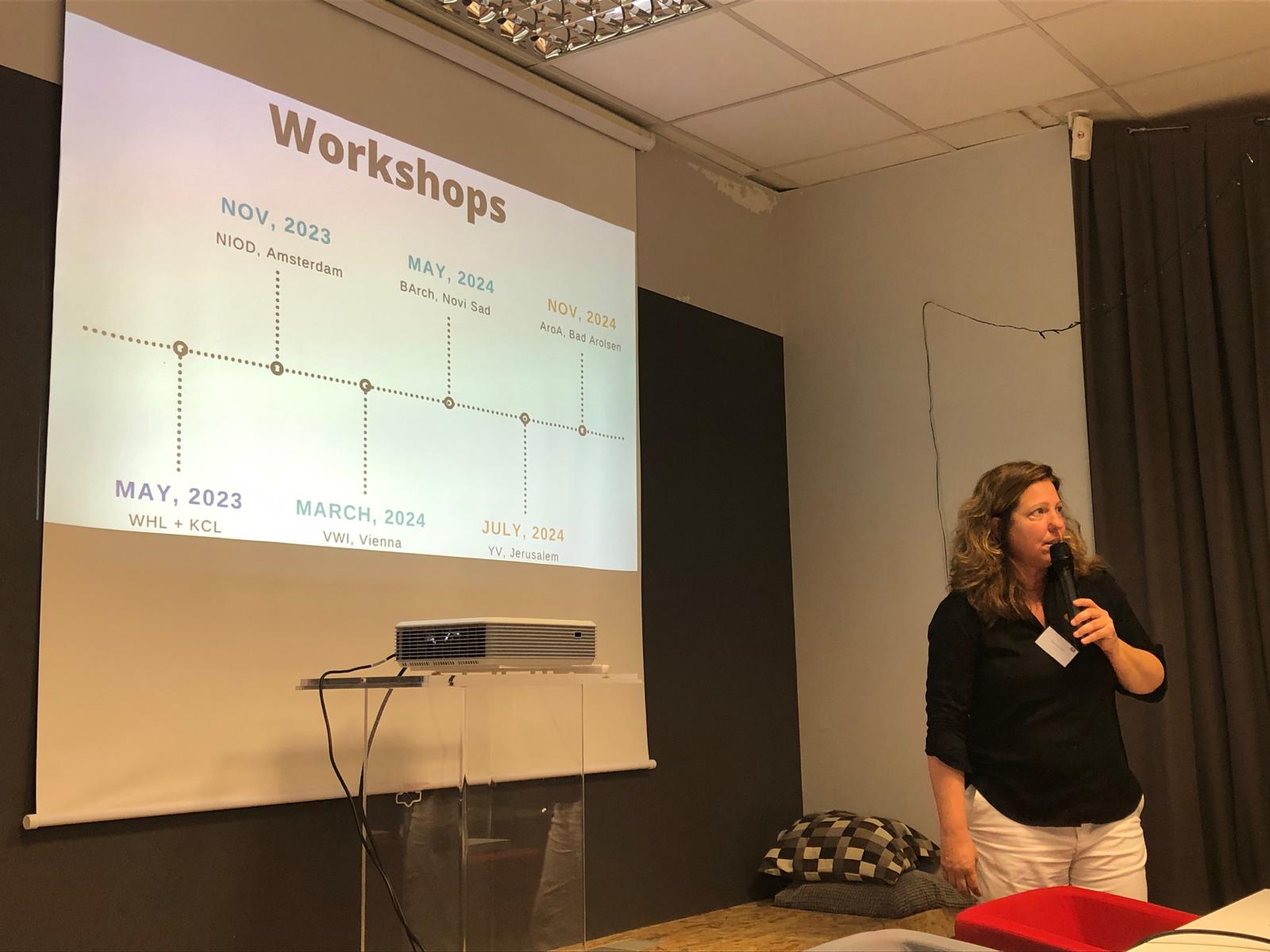EHRI General Partners Meeting – June 19, 2024

EHRI was praised for its “exceptional results”
The day after the EHRI Academic Conference: Researching the Holocaust in the Digital Age, EHRI’s annual General Partners Meeting was hosted by the Emanuel Ringelblum Jewish Historical Institute, Warsaw. Over fifty members of the European Holocaust Research Infrastructure (EHRI) consortium, representing more than fifteen countries gathered to hear the latest updates of the work of EHRI.
Before everyone gathered for the plenary session in the afternoon, several Work Package team meetings were held in the morning, where forthcoming work was planned and deliverables were discussed. There was also the opportunity for the Project Management Board (photo below) to meet and review the success of the previous day’s conference, next steps for EHRI, and the latest work of the EHRI-3 project.

Project Management Board EHRI-3
Guided tour
For those not involved in the meetings there was the possibility to have a guided tour of the Jewish Historical Institute, which proved a fascinating insight into the collections and exhibitions housed there. This was the second guided tour the Jewish Historical Institute had organised during the visit of so many colleagues from around the world. On the Monday before the conference, over thirty people had taken part in an impressive and illuminating tour of the place of the former Warsaw Ghetto, that set the tone for the conference and meetings on the days that followed.
Plenary presentations

After a delicious lunch, where many opportunities were taken to catch up with colleagues and develop new ideas, it was time for the plenary presentations. EHRI partners were welcomed by Michał Trębacz, Acting Director of the Jewish Historical Institute, who spoke of the encouragement he felt in how EHRI fosters and supports transnational research and how that links with the goals of the Institute. Karel Berkhoff, Co-Director of EHRI and senior researcher at the Dutch NIOD Institute for War, Holocaust and Genocide Studies, then offered his own welcome, reminding those present of the progression of EHRI-3 from 2020 to the present day as well as thanking all those who had worked so hard to organise events in Warsaw.
“Exceptional results”
Karel then presented an overview of the recommendations from the first and second periodic reviews of EHRI. Having worked on the areas highlighted by the European Commission, EHRI was praised for its “exceptional results” – a huge encouragement that reflects the hard work of EHRI partners over the past four years. The European Commission has also agreed an extension to the project until February 2025. This presentation was followed by Rachel Pistol, King’s College London, UK, who gave an update on dissemination within EHRI, presenting statistics from the past year’s use of EHRI resources including by geographic region. The information collected from these analyses informs the direction of EHRI’s dissemination plans and areas to focus on in the coming months.
Connections and Innovations

The next panel focused on ‘Connections and Innovations’. Michal Frankl and Michala Jandák Lônčíková, both of the Masaryk Institute and Archives of the Czech Academy of Sciences, Czechia, updated those present on the success of the EHRI Document Blog – particularly its Ukraine thematic series – the EHRI Webinar series, the EHRI Online Editions and the EHRI Geospatial Repository. The Online Editions have been growing during EHRI-3 and are proving useful for additional purposes such as training models for named entity recognition and members of the consortium were encouraged to upload their data to the Geospatial Repository. This presentation was followed by Rebecca Dillmeier, of the United States Holocaust Memorial Museum, explaining the creation of data management plans, digital preservation and interdisciplinary workshops on hacking the archive and challenges and opportunities of digital Holocaust research. Transnational workshops have been organised in several countries as well as in cooperation with other European Research Infrastructures including the Common Language Resources and Technology Infrastructure (CLARIN). As Rebecca noted, technology is continuing to change, faster and faster, which expands EHRI’s research possibilities and is worthy of further exploration. The session concluded with Katharina Freise, NIOD Institute for War, Holocaust and Genocide Studies, discussing the impact and innovation activities of the project, including an update on the latest season of the EHRI Podcast, as well as the work undertaken on how GDPR legislation affects Holocaust research across Europe and beyond.

Connecting Expertise and Archives
Sigal Arie Erez, Arolsen Archives, Germany, opened the EHRI Labs session on ‘Connecting Expertise and Archives’ with a focus on micro-archives – small/personal archives EHRI is working to make more visible and accessible. Sigal updated the consortium on the international workshops already held and others planned to engage with these collections. Veerle Vanden Daelen, Kazerne Dossin, Belgium, then talked about the latest developments in data integration, supporting colleagues in Ukraine, using local experts to help preserve data, and updates taking place in the EHRI Portal. Not only is metadata being reviewed and updated, country reports and institution descriptions have been revised, regional hubs for exchange of expertise have been created, and transnational knowledge exchange is being encouraged. The consortium were reminded of the huge amount of information held in the Portal and the standards and guidelines required to keep the Portal running to the highest standards.

Angel Chorapchiev, Yad Vashem, Israel, continued this focus on expertise when explaining the integration of regional research communities of experts relating to various themes of importance in Holocaust research, including information services and photography. The Expert Lab has provided assistance in data integration, database creation and digitization.
Access, Training and Education Services
The final panel of the plenary session was titled ‘Access, Training and Education Services’. Johannes Meerwald, Leibniz Institute for Contemporary History, Germany, described the EHRI Seminars that have taken place across Ukraine, Romania, Poland, Germany, Austria and Czechia with over 88 participants from 21 countries. Two more seminars are planned and there is clearly demand for more. Johannes also provided an update on EHRI’s Massive Open Online Course (MOOC) and the encouraging numbers of individuals who have already completed it. Ana Bărbulescu, “Elie Wiesel ” National Institute for the Study of the Holocaust in Romania, gave an overview of the 100 EHRI Conny Kristel Fellows who have participated in 454 weeks of transnational access at 17 EHRI partner institutions. Ana detailed the thematic interests of the fellows and the huge variety of scholars who have benefited from this resource over the past four years. Rachel Pistol, King’s College London, concluded the session by giving an overview of EHRI resources, showing the upwards trend in usage of all resources including an average of 32,000 sessions per month on the EHRI Portal.
This concluded the plenary session and the consortium was free to discuss the vast amount of information provided to them during the day. It was a fantastic opportunity to bring the consortium together and renewed the optimism of those present for what EHRI has achieved and will continue to work towards in future.
